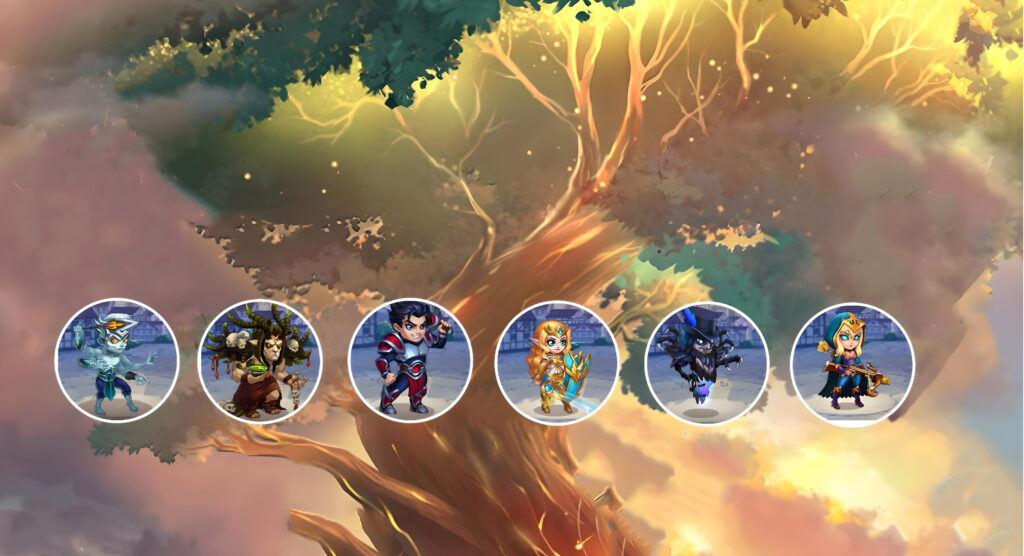
Each hero falls into a specific group or “branch,” and they all bring something special to the fight.
In this guide, we’ll break down these hero branches, so you know who’s who and what they can do.
Picture tanks as the tough guys in the front, mages casting powerful spells, control experts messing with the enemy’s plans, and healers patching up their friends. Then, there are marksmen taking precise shots, support heroes backing up the team, and warriors bringing pure strength.
Whether you’re a Hero Wars pro or just starting, this guide is your map to understanding each hero branch. Lets get started.
Table of Contents
Tank Heroes
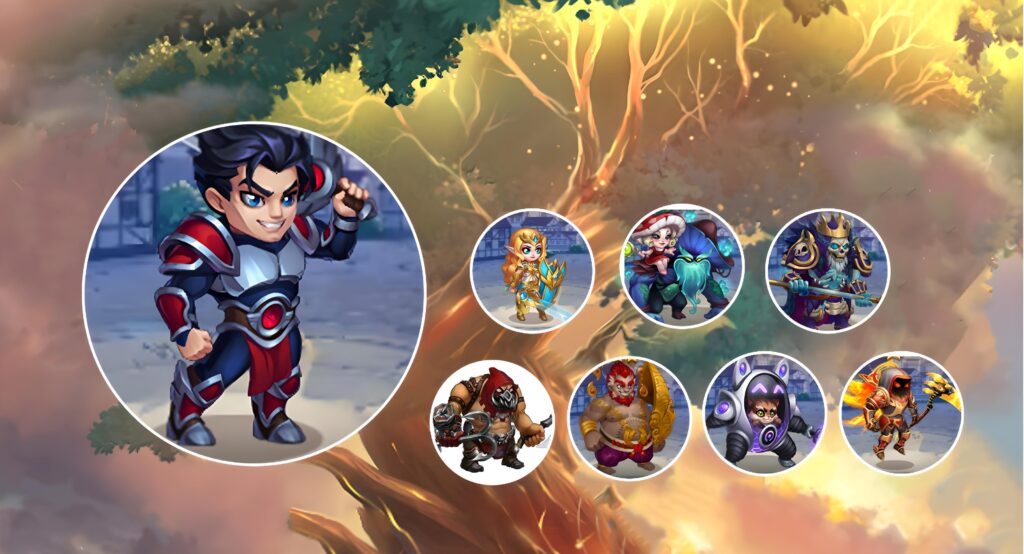
Tanks in Hero Wars are frontline heroes designed to absorb damage, protect their teammates, and create a sturdy presence on the battlefield.
Here are some common traits and roles associated with tank heroes in Hero Wars:
High Durability: Tanks typically have high health pools, armor, and resistance, making them resilient to enemy attacks.
Taunting Abilities: Tanks often have skills that draw enemy attention, forcing opponents to target them instead of more vulnerable allies.
Crowd Control Resistance: Tanks may possess resistance to crowd control effects, allowing them to maintain control of the battlefield.
Protective Abilities: Many tank heroes come with skills that provide shields, damage reduction, or other protective effects to themselves and their teammates.
Disruption: Some tanks have disruptive abilities, such as stunning or slowing down enemies, to disrupt enemy plans.
Examples of tank heroes in Hero Wars include but may not be limited to: Astaroth, Galahad, Ziri, Cleaver etc.
Mage Heroes
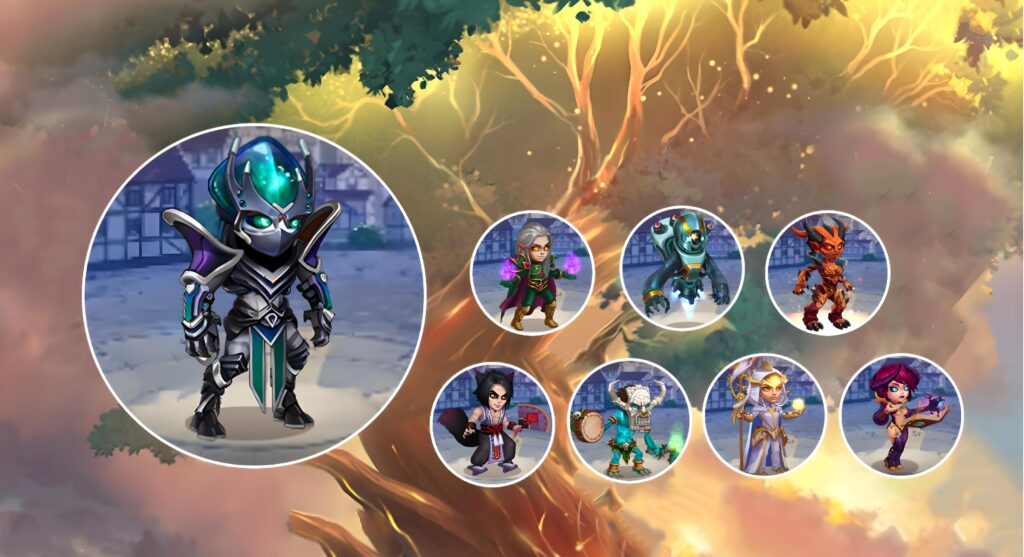
Mages in Hero Wars are magical damage dealers known for their powerful spells and abilities. They often play a crucial role in dealing area-of-effect damage, controlling the battlefield, and influencing the outcome of battles through their magical prowess.
Here are some common characteristics and roles associated with mage heroes in Hero Wars:
Magical Damage: Mages primarily deal magical damage, making them effective against enemies with low magic resistance.
Area-of-Effect Spells: Many mage heroes have skills that target multiple enemies in an area, making them effective in crowd control situations.
Crowd Control: Mages often possess crowd control abilities, such as stuns, silences, or other debuffs, to disrupt enemy formations.
Utility Spells: Some mage heroes come with utility spells that provide buffs to allies, debuffs to enemies, or other strategic advantages.
High Burst Damage: Mages can deliver high burst damage, especially when utilizing their ultimate abilities.
Examples of mage heroes in Hero Wars include but may not be limited to: Mojo, Iris, Helios etc
Marksman Heroes
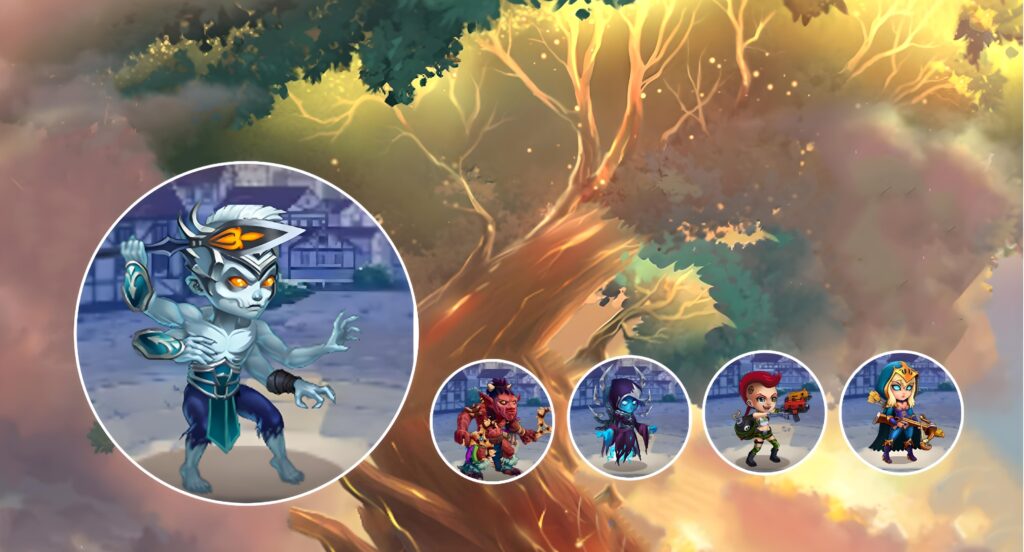
Marksman heroes excel in dealing damage from a distance, often targeting specific enemies or providing consistent damage to the opposing team.
Here are some common traits and roles associated with marksman heroes:
Ranged Attacks: Marksman heroes primarily engage enemies from a distance, allowing them to avoid direct melee combat.
Precision Shots: Marksman heroes often have skills that involve precise targeting, allowing them to focus on specific enemies or exploit weaknesses.
High Damage Output: These heroes are designed to deal significant damage, making them valuable damage dealers in a team composition.
Critical Hits: Marksman heroes may have abilities that increase their critical hit chance or deal extra damage on critical hits.
Area-of-Effect Attacks: Some marksman heroes have skills that deal damage to multiple enemies in an area, making them effective in crowd control situations.
Supportive Abilities: Certain marksman heroes may also have supportive skills, such as debuffing enemies or providing buffs to allies.
Examples of marksman heroes in Hero Wars include but may not be limited to: Keira, Artemis, Jhu, Daredevil etc.
Healer Heroes
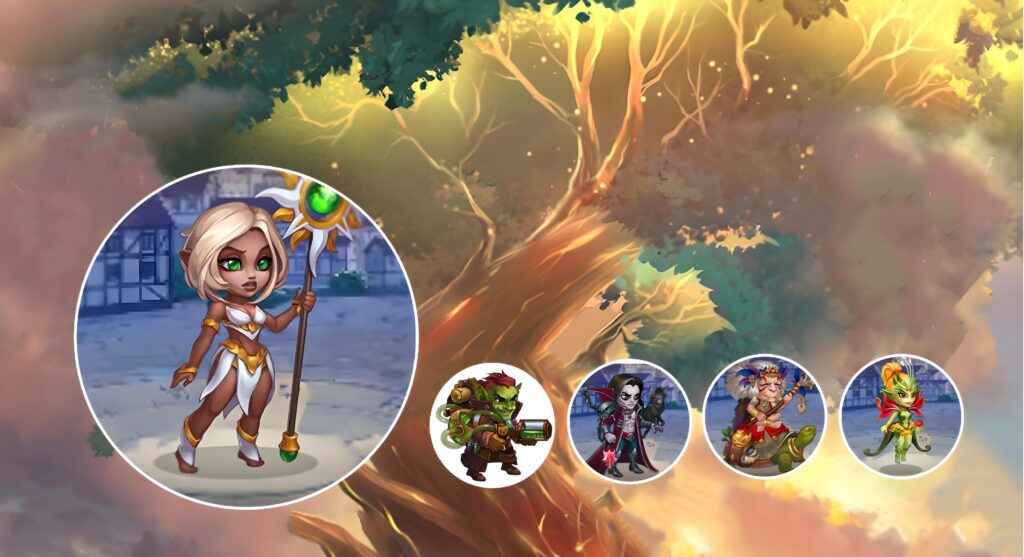
Healers play a crucial role in sustaining the health of their team members during battles, providing support and ensuring the team’s longevity. These heroes are essential for maintaining the overall well-being of the team.
Here are some characteristics and roles associated with healer heroes in Hero Wars:
Healing Abilities: Healer heroes specialize in skills that restore health to themselves and their teammates. They often have both single-target and area-of-effect healing abilities.
Supportive Skills: In addition to healing, many healers come with supportive skills such as removing debuffs, providing shields, or offering buffs to enhance the team’s performance.
Resurrection: Some healer heroes possess the ability to resurrect fallen teammates, offering a second chance in battle.
Energy Manipulation: Certain healers can manipulate energy levels, either speeding up their team’s energy regeneration or slowing down the enemy’s.
Debuff Removal: Healers may have skills that remove negative effects or debuffs from their allies, contributing to the team’s overall resilience.
Examples of healer heroes in Hero Wars include Martha, Dorian, Thea etc.
Support Heroes
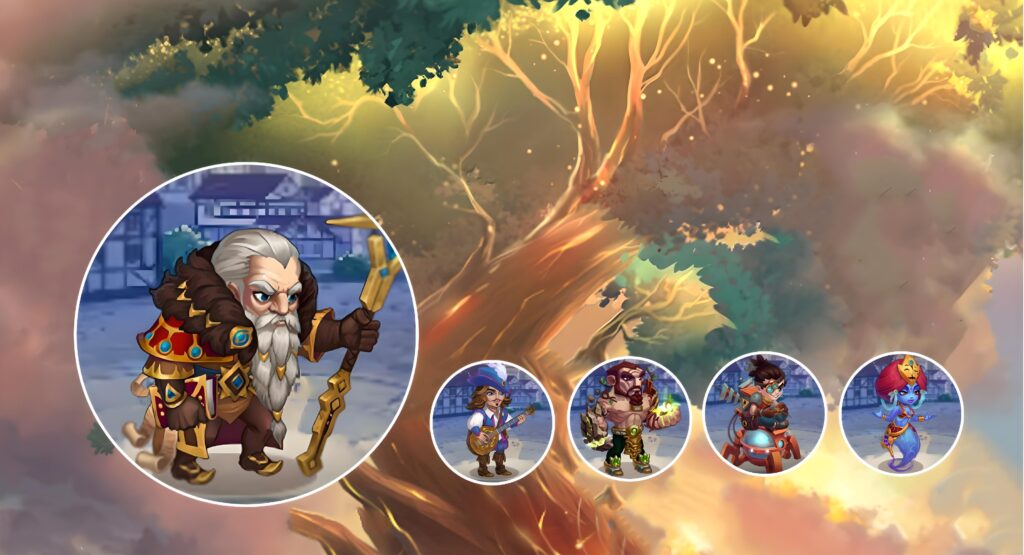
Support heroes play a crucial role in providing utility, healing, and strategic advantages to their teams. They are often instrumental in turning the tide of battles by offering support to their allies and disrupting the plans of their enemies.
Here are some common traits and roles associated with support heroes in Hero Wars:
Healing Abilities: Support heroes often have skills that can heal themselves and their teammates, helping to sustain the team during battles.
Utility Skills: These heroes may possess utility skills such as crowd control, silencing, or energy manipulation, allowing them to control the battlefield.
Buffing Abilities: Support heroes frequently offer buffs to their teammates, enhancing their damage output, resilience, or other attributes.
Revive or Resurrection: Some support heroes may have the ability to revive fallen teammates, providing a second chance in battle.
Debuffing Enemies: Support heroes may also have skills that debuff or weaken enemy heroes, making them more vulnerable to attacks.
Turn Order Manipulation: Certain support heroes can alter the turn order, potentially giving their team a strategic advantage.
Examples of support heroes in Hero Wars include Morrigan, Cornelius, Sebastian etc.
Warrior Heroes
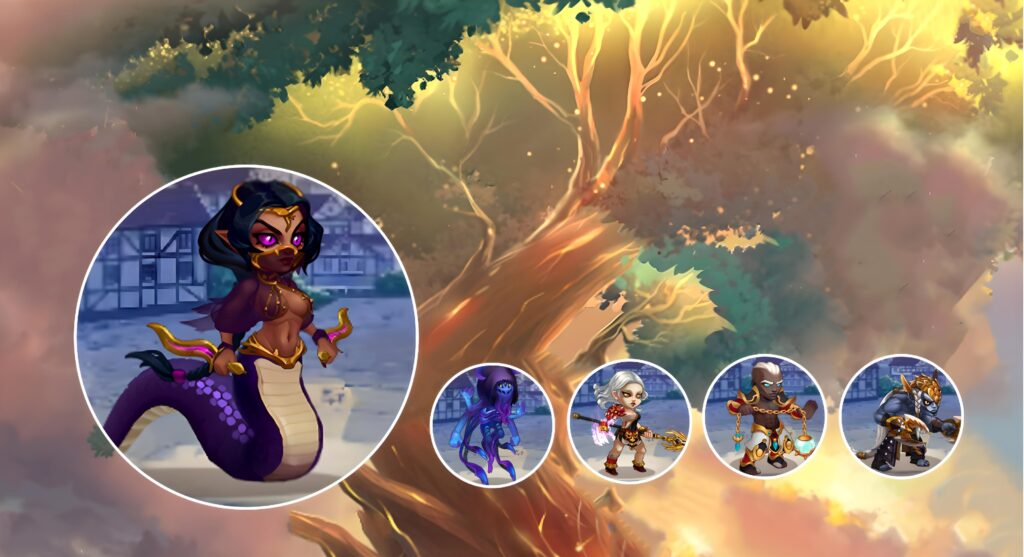
Warrior heroes are typically known for their durability, frontline presence, and the ability to withstand damage while dealing decent damage themselves.
They often serve as the backbone of a team, absorbing hits and creating space for their allies.
Here’s a general overview of what you might expect from heroes in the warrior category:
Tankiness: Warrior heroes are often designed to be resilient, with high health pools and armor, making them suitable for absorbing damage on the front lines.
Melee Attacks: Warriors are usually melee heroes, engaging enemies up close with physical attacks. Some may have area-of-effect attacks or crowd control abilities.
Protection: Many warrior heroes come with skills that provide protection to themselves or their teammates. This can include damage mitigation, shields, or defensive buffs.
Disruption: While not as focused on control as some other hero types, certain warriors may have skills that disrupt enemy formations or hinder opponent abilities.
Team Synergy: Warriors often complement teams that require a sturdy frontline. They can synergize well with support heroes and damage dealers, creating a balanced team composition.
Examples of warrior heroes in Hero Wars include Yasmine, Tristan, K’arkh etc
Control Heroes
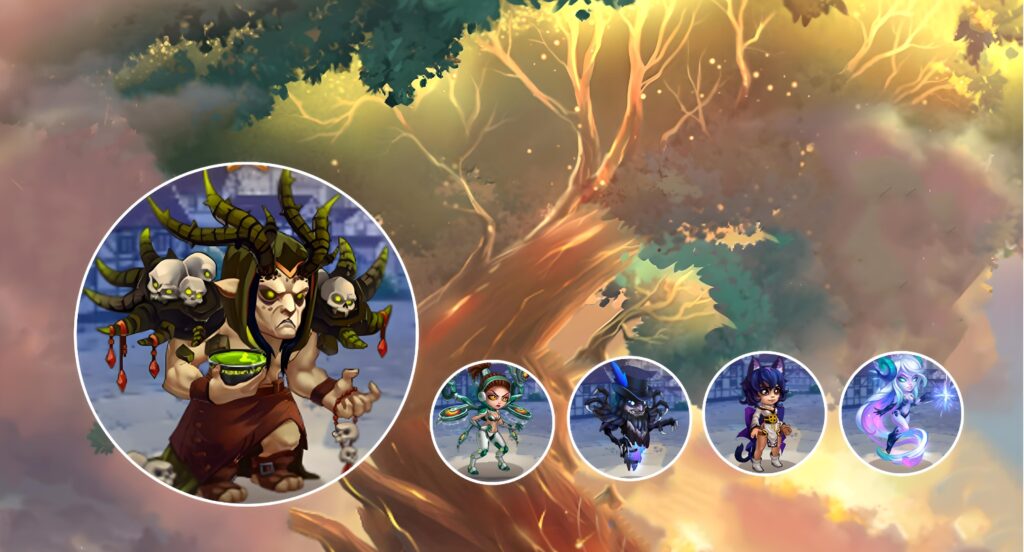
Control-type heroes in Hero Wars often excel in skills such as stuns, silences, energy manipulation, and turn order manipulation.
These abilities are strategically valuable in battles as they can disrupt enemy plans, prevent opponents from using their skills, and control the flow of combat.
Here’s a general overview of what control-type heroes might offer:
Stuns and Silences: These abilities prevent enemy heroes from using their skills, leaving them vulnerable to attacks.
Energy Manipulation: Some control heroes can manipulate the energy levels of enemies, slowing down or speeding up their skill activation.
Turn Order Manipulation: Altering the turn order can provide a tactical advantage by allowing your team to act before the opponent.
Disruption: Control heroes often have skills that disrupt enemy formations or inflict debuffs, weakening opponents over time.
Examples of Control heroes in Hero Wars include Jorgen, Phobos Arachne etc.
Conclusion:
In summary, every Hero Wars hero branch adds a unique flavor to the battlefield, as we have seen in our examination of them. Hero Wars provides a wide variety of heroes, each essential in their own right, from the unwavering toughness of tanks to the magical abilities of mages, the tactical skill of control specialists, the healing touch of support and healers, the precise strikes of marksmen, and the brute strength of warriors.
The secret to winning fights is to become proficient at mixing various characters, figuring out their advantages, and creating synergies. Hero Wars accommodates several play styles, whether you like to use a tactical strategy, steadfast support, or brute force.
FAQs
Q1: Can I mix heroes from different branches in my team?
Absolutely! In fact, creating a balanced team with heroes from various branches often leads to stronger synergy and better performance in battles.
Q2: Which branch is best for beginners?
For beginners, starting with a balanced team that includes tanks for protection, healers for sustain, and damage dealers like marksmen or warriors is a good approach. As you progress, you can experiment with different combinations.
Q3: How often are new heroes added to Hero Wars?
Hero Wars regularly introduces new heroes and features through updates. Keep an eye on in-game announcements or the official Hero Wars community for the latest additions and strategies.
Q4: Do heroes from the same branch always work well together?
While heroes from the same branch may share certain synergies, the effectiveness of a team depends on the specific skills and roles of each hero. Experiment with different combinations to find what works best for your playstyle.
Q5: Are there specific strategies for countering heroes from each branch?
Yes, understanding the strengths and weaknesses of heroes from each branch can help you formulate effective strategies. Check out specific guides for countering heroes and adapting your team composition accordingly.
Share your favorite hero combinations, strategies, or any tips you have for mastering Hero Wars in the comments below.
Your insights might just inspire fellow commanders on their heroic journey!